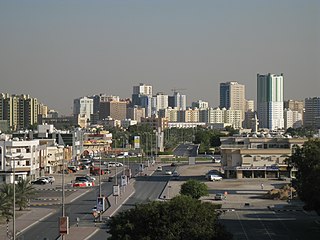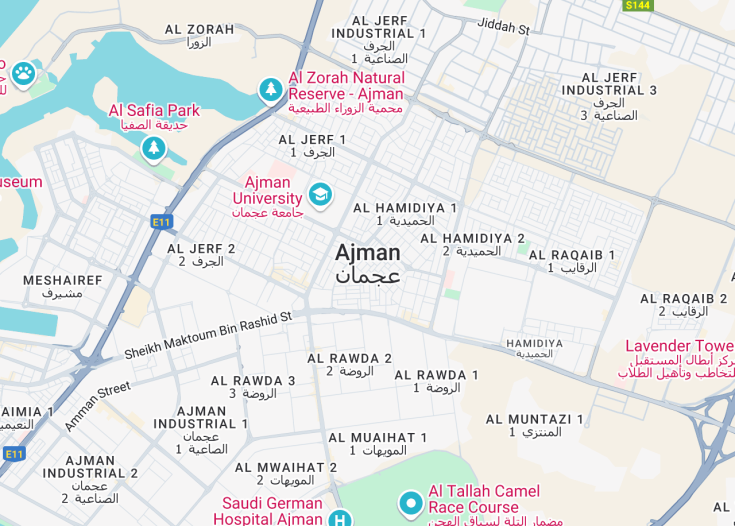Ajman, the smallest emirate in the United Arab Emirates, boasts a unique blend of ancient heritage and modern luxury. Nestled along the Persian Gulf, it offers a tranquil retreat from the bustling cities of Dubai and Sharjah. Despite its compact size, Ajman is rich in cultural attractions, including the Ajman Museum housed in an 18th-century fort, pristine beaches, and lush mangrove forests. The emirate’s economy benefits significantly from its expanding tourism and real estate sectors, making it an ideal destination for those seeking both relaxation and investment opportunities.
When visiting Ajman, consider staying at one of its luxurious beachfront resorts to enjoy direct access to sandy beaches and the warm, calm waters of the Gulf.
Prioritize a visit to the Ajman Dhow Building Yard to witness the traditional craft of dhow making, offering a unique glimpse into the maritime heritage of the UAE.
Top things to do & see in Ajman
Select the following sights and activities to discover best tickets and tours available in Ajman.
Ajman: A Hidden Gem in the Emirates
| Country | United Arab Emirates |
| Time in Ajman | GMT+4 |
| Language spoken | Arabic |
| Population | 504,846 (Worldometer) |
| Currency | UAE Dirham (AED د.إ) |
| Airports |
|
Ajman, one of the seven emirates of the United Arab Emirates, is situated along the pristine coast of the Arabian Gulf. Often overshadowed by its larger neighbors Dubai and Sharjah, Ajman offers a quieter, yet equally rich experience. With a history deeply rooted in maritime traditions, Ajman has transformed from a modest fishing village into a modern state while still maintaining its cultural heritage. The emirate’s economy thrives on industries such as shipbuilding, manufacturing, and retail, but it is Ajman’s commitment to preserving its natural and historic landmarks that truly distinguishes it.
Famous for its beautiful beaches, Ajman is also home to the Ajman Museum, housed in an ancient fort, giving visitors insight into Emirati life in days gone by. Moreover, the Al Zorah nature reserve, a vibrant ecosystem consisting of mangroves, lagoons, and marine life, showcases Ajman’s dedication to environmental conservation. Ajman’s real estate market has also been booming, with various luxury hotels and residential spaces which offer beautiful views and first-class amenities, appealing immensely to expats and investors.
Furthermore, what sets Ajman apart is its sense of community. The emirate’s relatively small size cultivates a more tight-knit community and a slower, more relaxed pace of life that can be a respite from the bustle of the larger emirates. Whether it’s the friendliness of its people, the tranquil beaches, or the active engagement in cultural and environmental conservation, Ajman offers a unique blend of tradition and modernity that makes it a special place in the UAE.
Where is Ajman?
Ajman is geographically positioned at the coast of the Arabian Gulf in the United Arab Emirates, just northwest of Sharjah.
Distances:
| Route | Distance by car | Time by car |
|---|---|---|
| Dubai to Ajman | 37 miles (60 km) | 40 min |
| Sharjah to Ajman | 11 miles (18 km) | 17 min |
| Abu Dhabi to Ajman | 114 miles (184 km) | 1 h 40 min |
What is Ajman famous for?
Aside from its rich maritime tradition, Ajman is known for its cultural sites like the Ajman Museum, lush green spaces like Al Zorah Nature Reserve, and burgeoning economic sectors, making it a versatile and attractive locale.
History
Ajman, the smallest of the Emirates in the United Arab Emirates (UAE), holds a rich tapestry of history that dates back to ancient times. The tale of Ajman weaves through centuries, marking its significance from early settlements to its role in the modern UAE.
Before 18th Century: Early Settlements
Historical references to early human activities in the Ajman region are sparse, but archaeological discoveries suggest that the area was inhabited by people engaged in fishing, pearl diving, and small-scale agriculture. These early settlers capitalized on the region’s strategic location along ancient trade routes, connecting them to the broader Middle East and the Indus Valley.
18th Century: Foundation and Rise
The formal foundation of Ajman as a political entity occurred in 1701 when the Al Nuaimi tribe, led by Sheikh Rashid bin Humaid Al Nuaimi, established it as their seat of power. The 18th century marked a period of consolidation as Ajman fortressed itself, both structurally and politically, amidst the regional power struggles.
19th Century: The Trucial States Era
The 19th century brought significant changes as the region became part of the Trucial States, entering into maritime truces with the British Empire. These truces were essential for securing peace and trade routes in the Persian Gulf, significantly impacting Ajman’s economic and political landscape.
20th Century: Formation of the UAE
Ajman’s modern history is profoundly shaped by its integration into the United Arab Emirates in 1971. Under the leadership of Sheikh Rashid bin Humaid Al Nuaimi, Ajman joined other emirates in forming the UAE, a significant transformation from a quiet fishing town to part of a dynamic national union. Industrialization and modernization projects followed, diversifying the economy beyond its traditional sectors of fishing and trade.
Visit Ajman
What to see and do in Ajman
Discover the charm of Ajman, where modern attractions meet rich heritage. Visitors can explore the Ajman Museum located in an ancient fort to uncover local history and culture. The city’s pristine beaches offer leisure and water sports, while the Al Zorah Nature Reserve is perfect for bird watching and kayaking through its mangroves.
Highlights of Ajman Events
Ajman is lively with annual events such as the Ajman Sea Festival, which takes places in December, showcasing maritime heritage with dhow races, fishing competitions, and watersport activities.
Best time to visit Ajman
The best time to visit Ajman is between November and March when the weather is cooler and suitable for exploring outdoors.
is Ajman worth visiting?
Ajman, despite being the smallest emirate, is certainly worth visiting. Its compact size harbors a blend of culture, history, and modern leisure attractions that offer a distinct experience away from the bustling crowds of the larger emirates. Whether it’s exploring heritage sites like the Ajman Museum, relaxing at the tranquil beaches, or immersing in natural beauty at the Al Zorah Nature Reserve, Ajman provides a unique and fulfilling travel experience.









